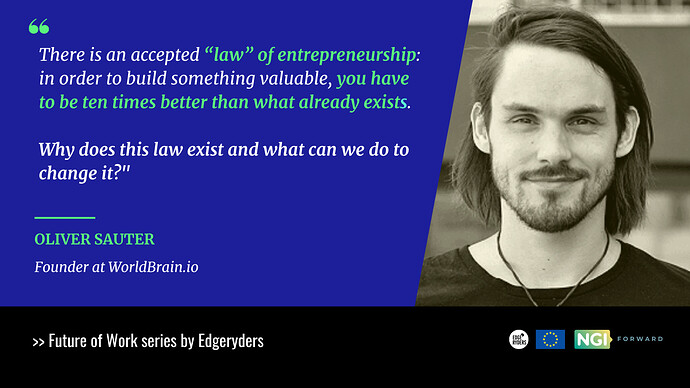Startups’ grand illusion? You have to be 10x better than what’s there.
This article is a summary of conversations with Oliver Sauter. He founded WorldBrain.io, a steward ownership business with the goal of battling online misinformation and societal polarisation at scale. They are building open-source tools for people to organise their online research, and build on other people’s research to understand complex topics quicker, deeper and with more nuance. Their tools are focused on providing maximum data sovereignty and freedom to move between providers - so no social or data lock-ins and full room for innovating on knowledge management tools. The two main tools they are developing are Memex and Storex.
We all have heard it: In order to build something valuable you it has to be 10X better than whats there. It seems like an accepted law of entrepreneurship. A law so strong that not even Google+, with Billions of backing, could not become a rival to Facebook. Google+ arguably had some features that made it a better service than Facebook.
This begs the questions if the reasons the 10x law exist actively prevents innovation from happening, why this ‘law’ exists in the first place and what we can do to change the rules?
Oliver Sauter believes it comes down to: Costs to switch (time and mental effort) > additional benefit offered *~10. Such growth requirements have produced some great leaps in innovation — but these come with downsides. How would the world look if we focussed more on incremental innovations?
What is holding us back? The way companies make money, for one: the 2nd quarter of 2018, Facebook lost $120bn (billion!) in stock value within 48 hours, the biggest loss of any company in history. The reason: It posted the least growth since its founding, while still making 5BN in profits the same quarter and growing by 42% since the last year. Secondly, data and social lock-ins create counter incentives for interoperable formats, which would make it easier for users to migrate between services or integrate them.
Breaking this dynamic would require tackling the problem from multiple angles: namely, allowing users to move freely between services, creating economic models that reward quality of service rather than simple growth, and ideally adopting open-source software to allow companies to build on one another’s work.
WorldBrain (dot) io is building open-source software in an attempt to enable incremental innovation, the foundation of which is Memex — an open-source privacy tool. Interoperability is baked deep into the core of Memex, it is fully open-source and WorldBrain (dot) io has no stock value, so is entirely focussed on building a sustainable service.
This was a summary of a longer conversation we are having in our community of technologists, entrepreneurs and policymakers around the opportunities and challenges of Next Generation Internet technologies.
The conversation continues on November 29 . We will introduce a new toolkit for participants to explore divergent futures and discover how each one of us can use our work to help shape a better tomorrow. Welcome to join us!
Visit the event page for more information and registration.
